Random Reminiscing: Looking Back at My Many Random Roles Interviews (Part 28 of Quite a Few)
Featuring anecdotes from Kane Hodder, Rita Moreno, Clancy Brown, Alan Cumming, Christina Ricci, Alan Ruck, and Jonathan Pryce
Back in 2021, when I celebrated the 10th anniversary of my first Random Roles, I was feeling a tad nostalgic, so I decided that I wanted to start looking back at my contributions to this A.V. Club feature, since it’s the portion of my freelance career of which I’m most proud.
If you accidentally missed the previous part of this reminiscing (and you may have, because it was in 2021!), you can check it out by clicking right here…and if you missed the part before that, well, each installment has a link to the previous installment in the intro, so just keep on clicking back until you’ve read ‘em all!
If you’re all up to date, though, then for heaven’s sake, why are you wasting time with this intro? Just dive right in!
Kane Hodder:
California Split (1974)—“Reno Poker Player”
It looks like your first work in front of the camera was actually for Robert Altman.
Kane Hodder: That’s one of the very first things I ever did. And it’s the only time I have ever been an extra in a project. But it was my first time ever being on a set, and here am I on this set with Elliott Gould and George Segal in a casino in Reno. I was in college, and I skipped classes for a day to go down and see what it was all about, because they were looking for extras, and I had so much fun that day that I did the same thing the following day. So I worked two days, and my documentary that’s just coming out… It’s called To Hell And Back, and it’s the story of my life, basically, but they were able to get the footage of those scenes that I was an extra in. It’s pretty funny to see what I looked like in my first on-camera appearance.
The idea of working on a film really was appealing to me, but I never thought at the time that I might do that for a living. So I went back to college and continued, I had a good time, and then after the semester ended, I went to visit my buddy down in Huntington Beach. I was in Reno, so I came down here for a little vacation, and one of the stops we made was at Universal Studios, to go on the tour. At the end of the tour, we watched the stunt show—it was a live Western stunt show—and while I was watching that show, I was hit with the idea that this was what I wanted to do for a living. I’d been doing stuff like this my whole life just to entertain my friends, doing dangerous shit just to see their reaction. Now I’m seeing that people get paid—and paid well—for doing the same stuff that I enjoyed doing for free. That’s when I decided that that’s what I wanted to do.
I went back to school for another semester while I investigated how a person becomes a stunt person, but the next summer I came down here, and I said, “I’m going to try going to stunt school.” There was a stunt school in Santa Monica, and I said, “I’m just gonna try it, and if I don’t like it, then I go back to college and finish my degree.” I fell in love the whole idea of being a stunt person even more, and I never went back to college. I decided to dedicate my life to doing stunts, and then because of that background, I’ve been able to play characters like Victor Crowley and Jason. And the rest is history, as they say.
Rita Moreno:
The Electric Company (1971-1977)—“Carmela / The Director / Pandora The Little Girl / Millie The Helper”
Rita Moreno: I love every minute of it. I felt like I was doing a community service, which indeed I was. It sure as hell wasn’t the money! Which, you know, it’s not that they were starving us to death, but it wasn’t that kind of a job. But we got to do wonderful stuff, and we had such creative performers. You know, obviously we had Bill Cosby, and we had Morgan Freeman, who was fabulous, but our whole cast was fabulous. We played a million characters. It was doing vaudeville and burlesque, is what it was. Only clean. And no stripping! [Laughs.]
But it was the best show in the world. It was great experience. It was really like doing theater every week. We’d be doing wonderful little sketches, a lot of “ba dum pum” stuff. And I loved playing the little blond brat with the huge golden curls. Pandora. [Does the voice.] “Hi, it’s me, Pandora!” And she was horrible! What I love is that she scared Dracula out of her room. Morgan Freeman was playing Dracula, and she scared him out of her room. And the crew used to love her, because I’d always show them my panties. You know, I had little-girl frilled panties. And I’d say “hi,” and flip up the dress. “Hi!” [Laughs.] And I always had Band-Aids on my knees… There was such detail with that character. All my little Mary Janes, the shoes always swallowed my socks. Oh, I loved it. I had the most fun. It was the vaudeville I never got to do when I was a kid.
You also had the director character.
Oh, that nasty Nazi? We used to call her Otto.
Yeah, and the origin of the name is pretty well documented, but did the inspiration for the name ever find out that he’d been an inspiration?
Otto Preminger, you mean? [Laughs.] I don’t know. But I know I named her Otto! And I named Morgan’s character “Marcello.” You remember how he used to take his hair and make it look horrible? He was so scared of me. I remember one time I said to him, “Why don’t you put Band-Aids on your fingers, like I’m always beating them with the sign with the word on it?” And he did. And I thought I would die. Oh, he was so funny…
The Electric Company was also responsible for you earning a Grammy.
Yes, I did! I got the Grammy for that one, and I got the Emmy for The Rockford Files. And also for The Muppet Show. But the Electric Company album… That was wonderful.
And I’m sure you’ve heard this a million times, but thank you. That show was directly responsible for helping my reading skills.
Oh, but isn’t that great? How can I ever get bored of hearing that? My husband’s German aunt from Poland learned to read English from The Electric Company. [Laughs.] She said, “Rita, dahlink, I can read the cans with the peas!” I said, “Really?!” She said, “Yes! I’m learning! I can read the peas and the carrots!”
Clancy Brown:
Bad Boys (1983)—“Viking Lofgren”
Since they were both done the same year, it’s hard to tell which was your first on-camera role. Was it Viking Lofgren in Bad Boys or Kelly on The Dukes Of Hazzard?
Clancy Brown: Viking. Yeah, Bad Boys begat Dukes of Hazzard. I was living in Chicago, and Bad Boys came through town, and they needed a local hire, so they hired me. And then winter came around, and I got evicted, and it was just too damned cold, so I put my dog in the car and drove to L.A. And when I got to L.A., the first job that was offered me was this second-banana bad guy in an episode of The Dukes Of Hazzard. And I thought, “Is this really what it’s gonna be like?” [Laughs.] And then I sort of looked at myself in the mirror and went, “Who the fuck are you? You’re nobody! You don’t know anything about this! Go and do it! What the heck!” So I went and did it… and I haven’t done anything like that since!
Regarding Bad Boys, Sean Penn reportedly had a very specific request for the actors playing the other prisoners.
Yeah, when he came in, he wanted people to spit on him. To really spit on him. It was weird. I mean, I wasn’t actually in that scene. I was kind of shot later, looking and watching him. And I don’t even think I spit. But he really wanted everybody to spit on him! I was, like, “This guy is weird!” [Laughs.] But, you know, who am I? So he got what he wanted. He was the star! I thought it was pretty effective. Now, for my introduction to him, I put a booger in his creamed corn or something, which upset my mother.
Being as it was your first film, how was the overall experience for you?
Oh, it was very instructive. It was long days. I thought of myself as a Chicago theater guy, and then Sean was—well, Sean was great. He’s had a long career, so it’s not like he hasn’t tripped, but I think he’s one of the best actors out there and has been for a long time. He was certainly into it then. Maybe he’s not as into it as he used to be. But he was certainly great then, and I learned a lot watching him. And I appreciated him. I liked working with him. He’s one of those rare actors who actually makes everybody around him better, especially when he cares about what he’s doing.
How did you find your way into acting in the first place? Your father was a newspaperman turned congressman, so not exactly a thespian.
No, but I had a neighbor who was a genius. He was younger than me, but he was in the same grade as me. So he had his own problems, but he was truly a genius guy. He would go on these learning jags, and because I was a neighbor and was raised in the Midwest, I was always neighborly with him, but he was very interesting. We’d go to Civil War battlefields or World War II museums, depending on what interested him. And one day he got interested in Shakespeare.
So we started reading Shakespeare plays together. Just, you know, on our own time. Most kids would be out there shooting bottles, running in front of cars, or other crazy stuff. This kid probably set me on the straight and narrow of the theater life, because I really liked reading Shakespeare. They had all these bloody things that happened to people, with swords and stabbings and whatnot, and I was really into that. And then you get seduced by the language, and I kind of fell in love with Shakespeare at an early age. Just loving it, though, but not aspiring to it or anything. Just being a fan of it, like I would a comic book.
So I was exploring it from there and had a good time with it, I went to high school and went to college and did plays, and when I graduated from college, I said, “You know, I think I’ll try this out for a couple of years and then go back and go to grad school or get a job and start my life.” And I’m still trying to get it out of my system, I guess.
Good luck with that.
Well, my parents were—and are—very indulgent, very patient people. They’re 90 now, and they’re still waiting for me to actually grow up! [Laughs.] My dad still asks me, “When are you gonna get a job?”
Alan Cumming:
Reefer Madness: The Movie Musical (2005)—“Lecturer / Goat Man / FDR”
Alan Cumming: That was a hoot and a half! I did that in Vancouver. Again, it was a lovely bunch of people. There were a lot of great people on that. I thought that was so clever, that show. I really thought the writers [Dan Studney and Kevin Murphy] were very, very clever. I wish they’d done more together. But that was another great part, very transformatory. [Laughs.] And a really biting script. I just had such a gas doing it. I’ve heard they’re trying to get a Broadway version going.
That’d be awesome.
It’d be a hoot, wouldn’t it? Again, it’s one of those that was a slow burn and people didn’t necessarily discover it when it came out, but over the years people have come to love it. And obviously, of course, stoners around the world rejoice and sing. Myself included!
I don’t even partake, but by the time “Listen to Jesus, Jimmy” was over, I was completely on board.
Isn’t that great? Yeah, he’s a great Jesus, [Robert Torti]. I remember the premiere—it premiered at Sundance—and I was sitting next to him and his wife [DeLee Lively], and after that number, she turned to me and said [Excitedly.] “I get to sleep with Jesus!”
Christina Ricci:
That Darn Cat (1997)—“Patti”
The Opposite Of Sex (1998)—“Dede Truitt”
Buffalo ’66 (1998)—“Layla”
Was there a particular film that you can pin down as being the one where you began your evolution from young actress into adult actress?
Christina Ricci: Well, I do think that Buffalo ’66, The Ice Storm, and The Opposite Of Sex were sort of the first movies that really were kind of my first legitimate adult movies and adult roles.
Was it difficult to make that transition? Or was it easier because they were so categorically adult in nature?
I think it was easy to make the transition. It was difficult for me personally to navigate being an adult celebrity versus being a child celebrity. It was also difficult to all of a sudden be a famous person when I was a child, and I didn’t really necessarily know who I was at the time, let alone what image of myself I wanted to project into the public arena. I think when you become famous as an adult, you sort of decide who you are and who you want to be known as, but when you’re growing up and you’re famous, you don’t have that ability or that objectivity. So for me it was very confusing being a young adult and being a celebrity.
Did it feel like an abrupt transition for you?
Yes. I don’t even think I had the objectivity to see it as abrupt. I was just in the middle of the whirlwind and reacting. Constantly just reacting to things. It definitely felt very unnatural. And now that I’m sort of more of a stable adult looking back, I definitely think [Starts to laugh.] it wouldn’t be my choice for another person, let’s say.
The reason I asked about the abruptness in particular is that, even though I was aware of all of these films when they originally came out, it wasn’t until I was putting together the list of projects to ask you about that I realized that That Darn Cat and Buffalo ’66 came out within a year of each other. That’s staggering.
Yeah, it’s a strange thing to have been a child, really, and protected, but at the same time encouraged and allowed to say anything and do anything, and then sort of released as this adult into the world, but an adult where people are still recording everything I say and… There’s a reason why there’s a traditional childhood. There’s a reason why family is still important. And why peers when you’re growing up are still important. I definitely had a very hard time as a young adult.
Do you feel like you came out of it relatively unscathed?
It took a very long time. And I think when I finally had my son, I was able to really understand what life is all about and what’s most important in life. And that has very much stabilized me.
Was there any point where you thought about just transitioning out of Hollywood rather than continuing beyond your years as a child actress?
I did when I was a lot younger. But, you know, this is a pretty good job. And I really love acting itself. I love filmmaking. I love being a part of it. The fame stuff, I could do without it, to tell you the truth. But the work itself? It’s my passion. I couldn’t do anything else.
Alan Ruck:
Going Places (1990-1991)—“Charlie Davis”
A reader on Twitter suggested this one and advised me to check out the opening credits.
Alan Ruck: So this is one of those times that I came out to Los Angeles, I auditioned for a few things, and all of a sudden there’s this element of the auditioning process that I’d never gone through before called the network test. You know, you audition for basically the writer and one of the producers, and then you come back and then maybe you audition for the director and one of the producers, and then you come back and audition for some more producers, and then you audition for the studio. And then you audition for the network. And each time, at least in my particular experience, you get more and more nervous. The first few times it’s loose and easy, then you start to second-guess yourself, and each time the response from the people you’re auditioning for is less and less. And it’s weird when you’re doing a comedy and the people in the room are smiling but they don’t laugh. So it’s just an intimidating thing.
But I did wind up in 1989, I think it was, doing a pilot with the late Nell Carter, who had a deal with NBC. So I had all these NBC people coming up to me saying, “Hey, buddy! What’s it feel like to have a steady job? This is on the air! Yes!” And I kind of bought into it, foolishly. I was old enough to know better, but I bought into it. And we just bombed. The pilot [Morton’s By The Bay] was terrible. It turned out to be a nothing. As the week went on—it started out as one thing on Monday, and by Friday it was a different animal. It was just formless. So that bombed. I think was, like, 32 or 33 years old, and I had moved my wife and baby out here from New York, I had rented this small house. I basically had spent all my money. And then the show bombed. And I actually had no marketable skills. So I went to work for an employment service, and they sent me to a Sears warehouse in East L.A.
So here I am, working at a Sears warehouse, and because Ferris Bueller had been out already, people were clocking me and going, “Do you know you look like this guy in this movie?” And I was, like, “Yeah, yeah, yeah. Not me. It’s not me. I’m not that guy.” Because I didn’t want to get into it. I thought that they’d probably go, “You were in the movies and then you wound up here? We should just beat you for being stupid!” So it was very grim and very humbling. And during the middle of that, Tom Miller and Bob Boyett called up my manager and said, “We want to meet Alan. We have an idea for a show, and he’d be right for it.” I’m working for minimum wage, and I have these guys calling me up and offering me a leading role in pilot. So I said, “Yes, thank you.” They sort of owned Friday nights, these guys. They had that TGIF thing. They had Perfect Strangers and Family Matters and a bunch of different stuff. And then they put us in there, and it just kind of… Well, again, it started out as one thing, and then they decided to add different characters and it became something else.
We did 19 episodes, and of the 19, I can honestly say that there was one show that was, like, sort of funny. Actually, no, it was funny. They did a very good job on that episode. But that was it. They were the nicest guys to work for, Tom and Bob, but the show just didn’t work, and it didn’t work from the beginning. It just didn’t work out. But, hey, I bought a house! But it was the kind of show where people would say, “Alan, you’ve got a show on! We’re gonna watch it Friday night!” And I’d be, like, “Nah, don’t worry about it. It’s okay. You don’t have to watch. Go out to dinner. Do something else.”
To jump back to the opening credits, what’s the direction you receive on something like that? “Okay, stop in front of Grauman’s Chinese Theatre and put your feet atop Jack Benny’s footprints. Now look up and just smile your heart out!”
Well, that’s kind of what they did. They were, like, “Okay, you crazy kids are out in Hollywood, your dreams should come true… Now let’s have a look at you!”
“Gimme a look that says, ‘I’m going places!’”
Yes! And it was such a setup for the critics, because the reviews… We were setting ourselves up for the slaughter with that title. “Going Places? Going nowhere!”
Jonathan Pryce:
Something Wicked This Way Comes (1983)—“Mr. Dark”
Jonathan Pryce: Ah, Mr. Dark! That’s a very special film for me. I’d just finished playing Hamlet at the Royal Court Theater, and [director] Jack Clayton had been to see it. I met him, and he offered me the role of Mr. Dark for Disney. Yeah, it was my first Hollywood film. Again, it was an eye-opener, because I was fortunate enough to have as my co-star and mentor Jason Robards, who kind of took me under his wing. We had a very good relationship, and he pointed out certain things like flaws and weaknesses in the Hollywood system, and how to stay strong.
It was a really interesting film that Jack Clayton made, one that was determinedly messed about with by Disney executives who were there at that time. They’d employed Jack to make a story film, which he’s very good at, and it was coming out at a time that there were lots of special effects films starting to happen, so they decided they didn’t want a story film, they wanted a special effects film, and they spent a year adding special effects to this rather scary Ray Bradbury story. I didn’t suffer from it. My character, Mr. Dark, was still a very powerful figure. But I think Jack suffered from it. He felt he’d been let down.
Well, it developed a cult following, at least.
Yeah, that word comes up quite a few times in my career. It comes up with Brazil as well, and with films like that and Something Wicked, people very happily say, “Well, you’re a cult actor.” But you don’t set out to be a cult actor. You set out to be a very successful actor that makes financially successful films! [Laughs.] We didn’t set out to make a cult film with Brazil. We set out to make a blockbuster. But there you go.





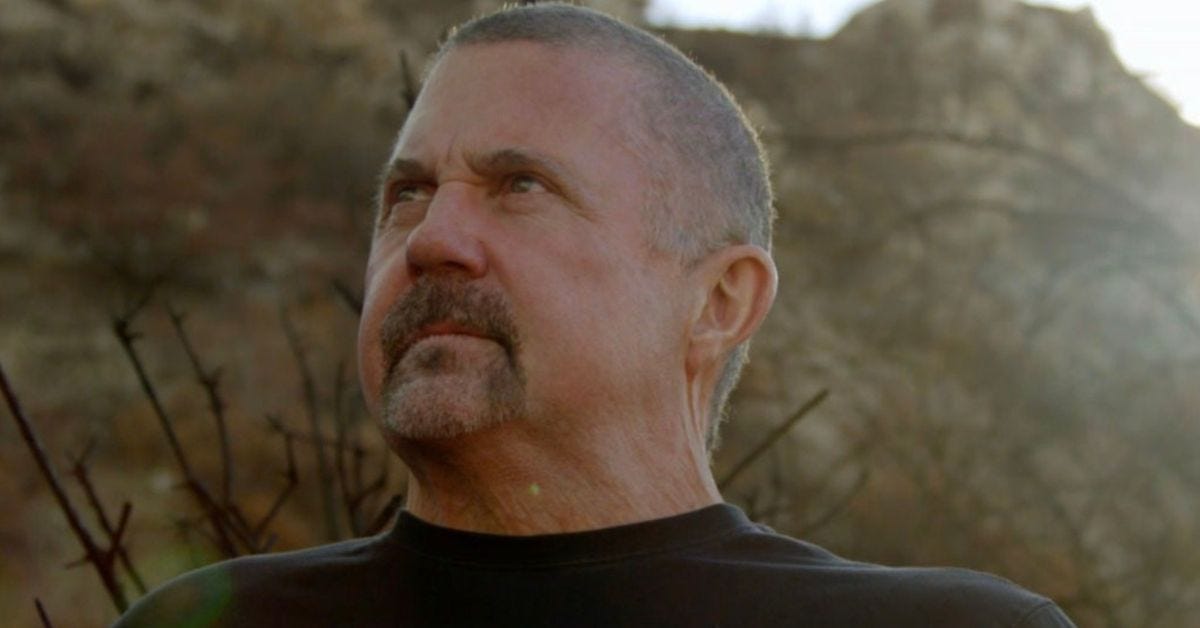
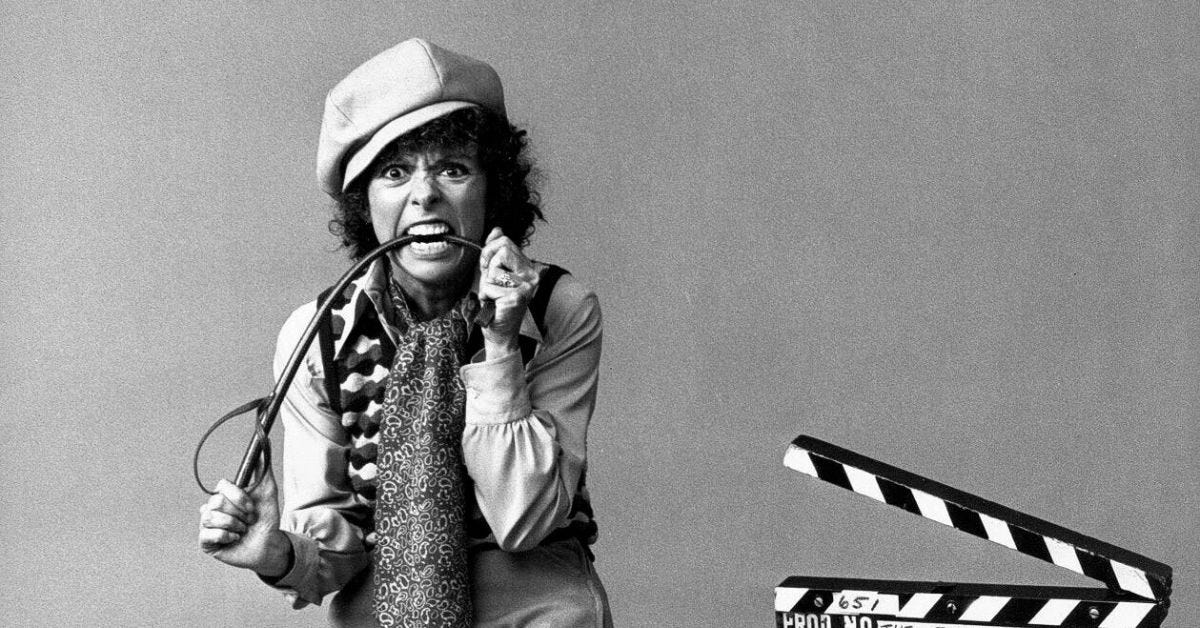
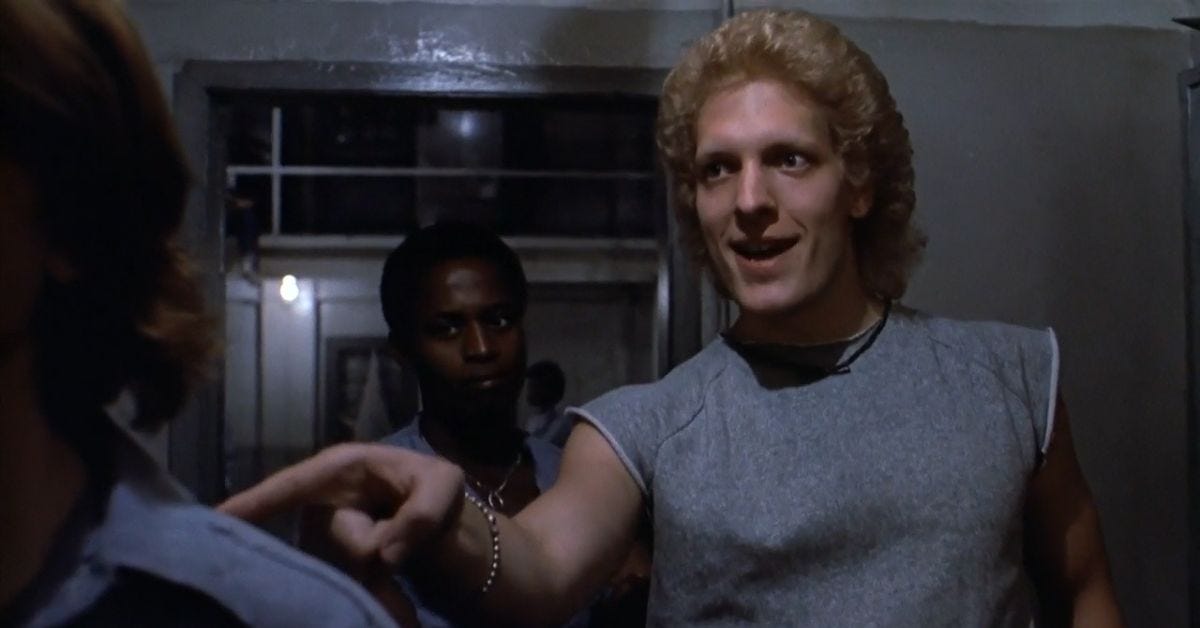
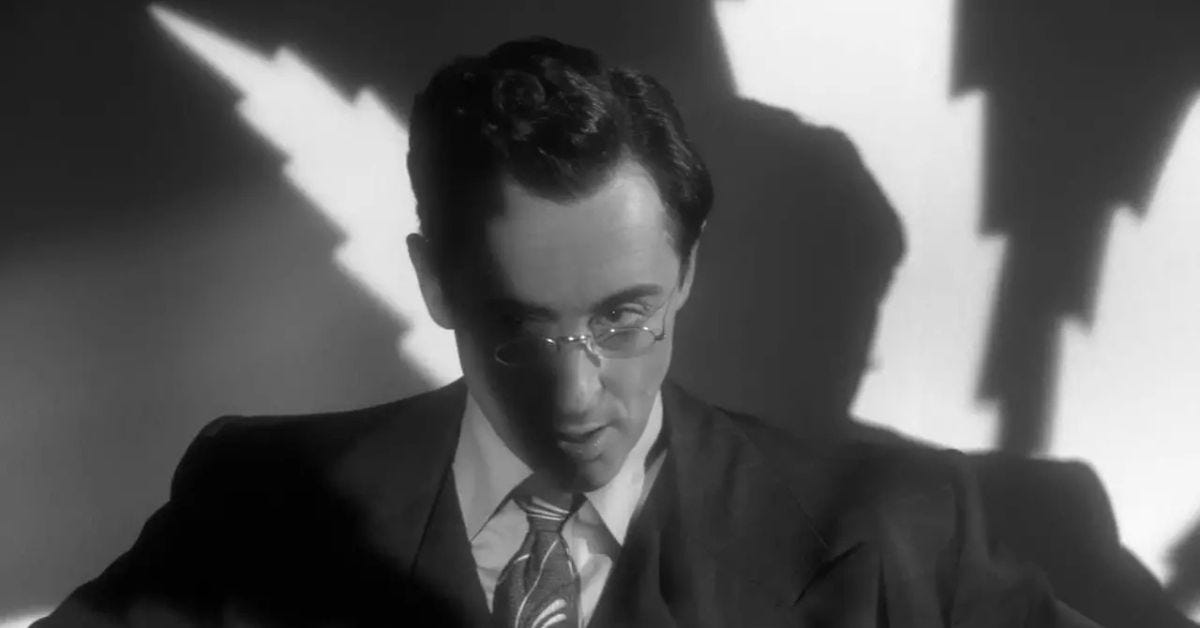
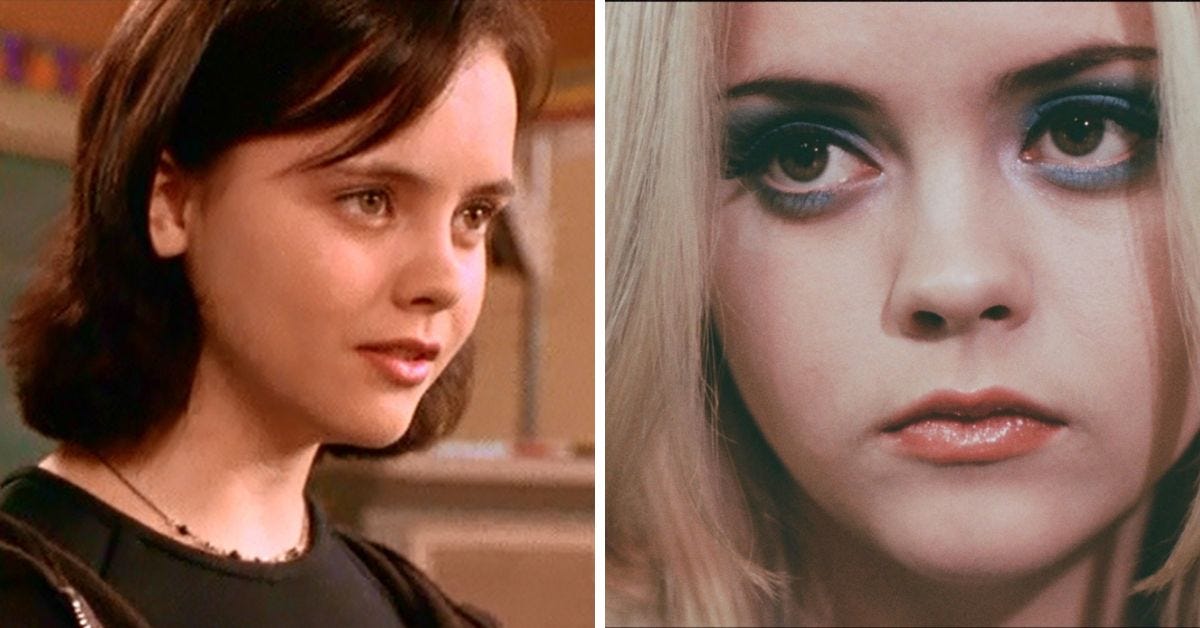

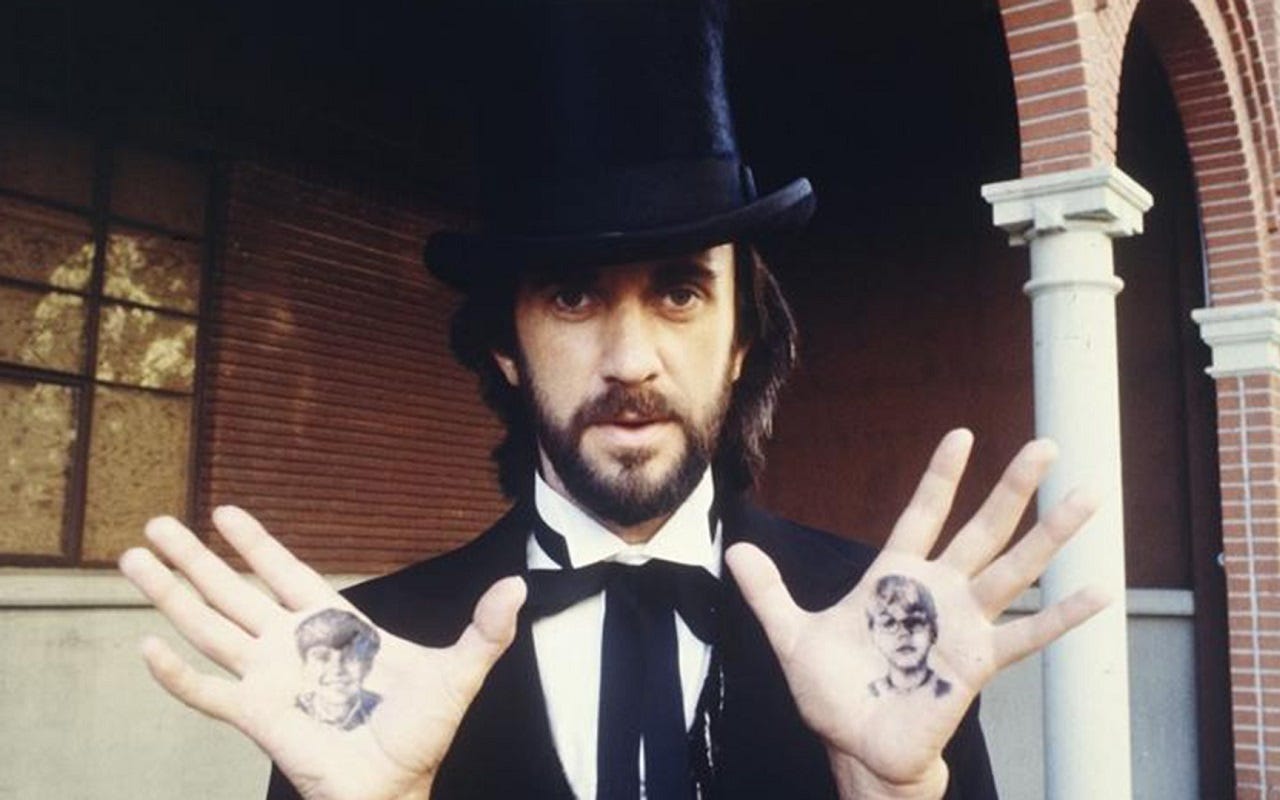
Wow, I don't remember "Going Places" at all. But that opening looks like every single ABC sitcom of that period. So much so that it looks like a parody of every ABC sitcom opening of that period.